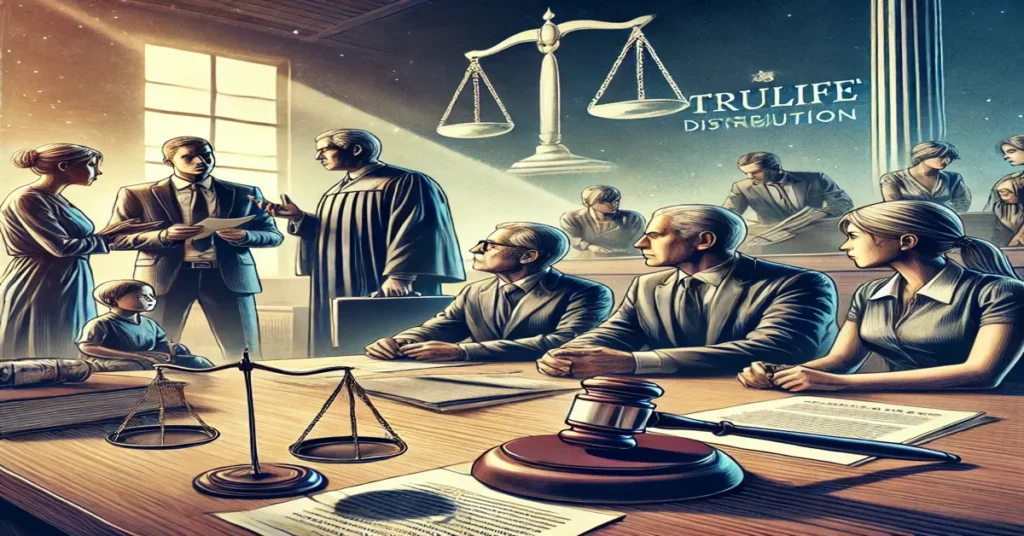The world of business is often rife with competition but when that competition spills over into legal disputes it garners significant attention. Such is the case with the ongoing lawsuit battle involving Trulife Distribution a prominent player in the distribution industry and Nutritional Products International (NPI). At the heart of this controversy lies not just a clash of corporate interests but also a complex web of family ties and historical rivalries.
This article delves into the Trulife Distribution lawsuit exploring the details of the case the parties involved and its implications for the industry. We’ll also examine the broader context of legal disputes in the distribution business and the lessons they offer.
Background of the Case
What is Trulife Distribution?
Trulife Distribution, established in 2019, is a distribution platform specializing in nutritional and wellness products. The company has made a name for itself in helping brands break into competitive markets, offering services like marketing, logistics, and sales support.
Who is NPI?
Nutritional Products International (NPI), founded in 2008, operates in the same industry and region as Trulife Distribution. The company assists nutritional and wellness brands in gaining market visibility and establishing a presence in retail and online platforms.
The Familial Connection
What sets this legal dispute apart is the familial relationship between the CEOs of the two companies. Mitch Gould, CEO of NPI, and Brian Gould, CEO of Trulife Distribution, are father and son. This dynamic adds a layer of complexity and intrigue to the lawsuit, blending professional competition with personal relationships.
Key Issues in the Lawsuit
The Trulife Distribution lawsuit revolves around allegations of unfair business practices, breach of contracts, and potential intellectual property disputes. While specifics of the case are still unfolding, the following themes emerge as central points of contention:
Alleged Unfair Competition
NPI has accused Trulife Distribution of engaging in practices that undermine its business operations. These allegations include claims of targeting NPI’s clients and leveraging insider knowledge to gain a competitive edge.
Breach of Contract
The lawsuit also raises questions about agreements and contracts that may have been violated, potentially involving confidentiality clauses and non-compete agreements.
Intellectual Property Disputes
In an industry where branding and proprietary methods are critical, accusations of intellectual property misuse add another dimension to the legal battle.
The Impact of Family Ties
Personal and Professional Tensions
The familial connection between Mitch and Brian Gould adds an emotional layer to the lawsuit. Family disputes spilling into the professional realm can intensify tensions and make resolution more challenging.
Perception in the Industry
The industry watches this case closely, as it highlights the complexities of mixing family dynamics with competitive business practices. Stakeholders and competitors are likely forming opinions about how the outcome may influence future collaborations and rivalries.
Broader Implications for the Distribution Industry
The Role of Legal Disputes in Business
Legal battles, while not uncommon, can significantly impact a company’s reputation and operations. In the distribution sector, where trust and relationships are paramount, lawsuits can lead to long-term consequences.
Lessons for Other Businesses
The Trulife Distribution lawsuit offers valuable lessons for companies navigating competitive markets:
- Clarity in Contracts: Ensure agreements are comprehensive and leave no room for misinterpretation.
- Ethical Competition: Competing fairly and ethically strengthens industry relationships.
- Conflict Management: Addressing disputes through mediation or arbitration can prevent public legal battles.
The Industry’s Perspective on the Lawsuit
Stakeholder Reactions
Industry stakeholders, including clients, partners, and competitors, are observing the case for its potential outcomes and precedent-setting implications. The lawsuit raises questions about how companies should handle competitive overlap and family dynamics in business.
Media and Public Interest
The legal battle has drawn media attention due to its dramatic elements, including the family feud and high-stakes allegations. Public perception can influence brand reputation and customer loyalty.
The Future of Trulife Distribution and NPI
Potential Outcomes
The resolution of this lawsuit could take various forms:
- Settlement: Both parties may reach an agreement outside of court to avoid prolonged litigation.
- Judicial Decision: A court ruling could set legal precedents affecting the industry.
- Business Impact: The outcome may influence the strategies and operations of both companies moving forward.
Navigating Post-Lawsuit Challenges
Regardless of the outcome, both Trulife Distribution and NPI will need to rebuild trust, strengthen their operations, and focus on their core missions to maintain their positions in the market.
Conclusion
The Trulife Distribution lawsuit is more than a legal dispute; it’s a case study in the intersection of family, competition, and business ethics. As the legal proceedings unfold, they shed light on the challenges companies face in protecting their interests while navigating complex relationships. For the industry, the case underscores the importance of clear agreements, ethical practices, and effective conflict resolution.
FAQs
What is the Trulife Distribution lawsuit about?
The lawsuit involves allegations of unfair competition, breach of contract, and intellectual property disputes between Trulife Distribution and NPI.
Who are the key figures in the case?
Mitch Gould, CEO of NPI, and Brian Gould, CEO of Trulife Distribution, are at the center of the legal battle. They are father and son.
Why is the lawsuit significant?
It highlights the complexities of combining family dynamics with professional competition in the business world.
What impact does the lawsuit have on the industry?
The case raises important questions about ethical competition, trust, and legal practices in the distribution sector.
What are potential outcomes of the lawsuit?
The case could result in a settlement, a court ruling, or long-term operational changes for both companies.
What lessons can other businesses learn from this case?
Businesses can learn the importance of clear contracts, ethical practices, and addressing conflicts through mediation rather than litigation.







